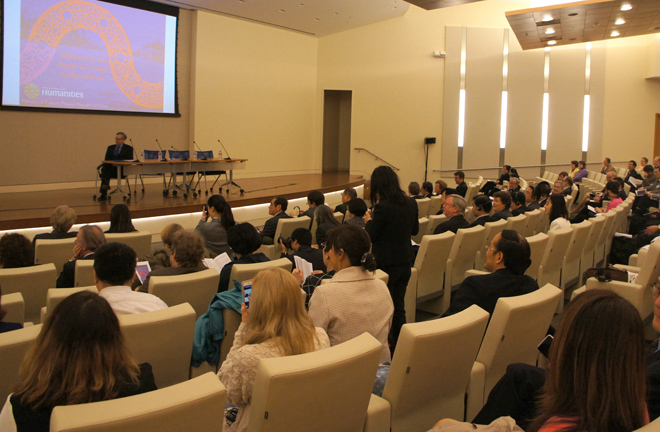Forum: Humanities build bridge between US, China

Co-sponsored by the National Endowment for the Humanities in cooperation with China’s Ministry of Culture, a one-day conference on scholarly collaboration between China and the United States in the humanities was hosted in the Constitution Center in Washington, D.C. on April 4.
On April 4, the Constitution Center in Washington, D.C. hosted a one-day conference on scholarly collaboration between China and the United States in the humanities with the aim of developing joint projects in research and instruction.
Co-sponsored by the National Endowment for the Humanities (NEH) in cooperation with China’s Ministry of Culture, this year’s forum focused on the topic “Cultivating Collaboration: Bridging Cultures through Humanities Research and Innovation.”
More than 20 scholars and experts from universities, academic organizations and museums attended the roundtable discussions and plenary sessions on international collaboration in the humanities. Ding Wei, vice minister of China’s Ministry of Culture, and William Adams, chairman of the National Endowment for the Humanities, gave the opening speeches.
Ding pointed out that China and the US are building a new model of relations, and they should use culture as a tool to deepen mutual understanding between the two countries. There is a trend toward open-mindedness in universities and society in China, including in teaching materials about the outside world. The Chinese educational system is offering much information about Western society, Ding said.
“NEH recognizes the importance of international collaboration in many spheres of humanities research and has designed the forum in partnership with China’s Ministry of Culture, to highlight successful models of collaboration and encourage new efforts to pursue shared interests in fields ranging from scholarly translation, digital humanities to online education.” Adams said.
Leslie Bowman from the Thomas Jefferson Foundation gave an introduction to the partnership between the foundation and the National Library of China for an exhibition to commemorate Thomas Jefferson. Lou Wei, vice director of the Palace Museum of China, also said that the cooperation with the Virginia Museum of Fine Arts for the exhibition titled “Forbidden City: Imperial Treasures in 2014” was a big success.
Carswell Professor of East AsianLanguages and Civilizations from Harvard University Peter Bol talked about the school’s Chinese courses and his understanding of Chinese culture as an American. He said the course Chinese Ethical and Political Theory, with an enrollment of more than 700, was second in terms of popularity only to Introduction to Computer Science and has surpassed perennial favorites like Positive Psychology. As its economy grows and its status rises, China, with a history of diversity, openness and changes, will play a more important role in the world arena. “The more we can teach Chinese in America, the better.” Bol said.
Liu Dong from Tsinghua University, Chen Pingyuan from Peking University, Jamie Monson from Macalester College, Marvin Bolt from the Corning Museum of Glass, and Lu Jiande, director-general of the Institute of Literature at the Chinese Academy of Social Sciences also gave speeches that highlighted the experiences and fruits of international collaborative projects. Zhao Zhouhao, deputy director of the Survey and Data Center of Chinese Academy of Social Sciences and Li Xinfeng, deputy editor-in-chief of Social Sciences in China Press, joined the small group discussions on the topics “big data and digital humanities” and “scholarly translation.”
Zhang Xiaoxi is a reporter at the Chinese Academy of Social Sciences.
